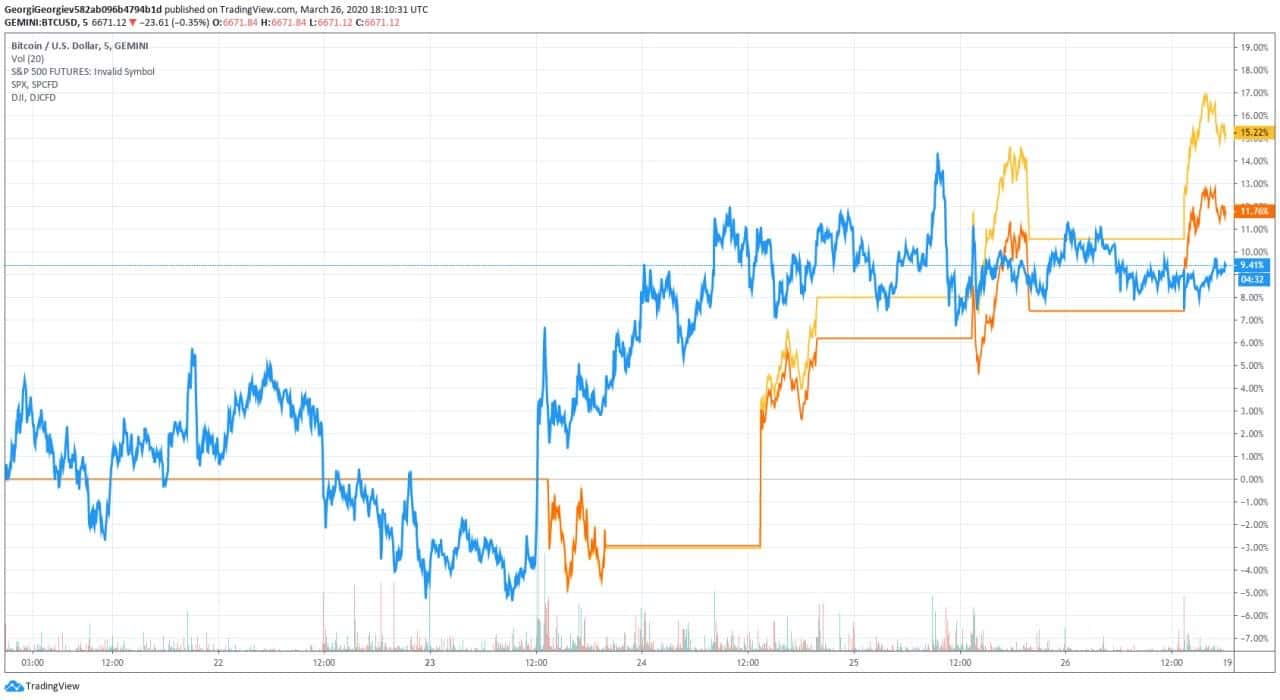Bitcoin fell sharply along with all other assets during the global valuation collapse. Because it tracked with other assets like stocks, gold, and oil, there were more questions about Bitcoin correlation. Is Bitcoin an uncorrelated asset? One that doesn’t consistently move in the same or opposite direction as other securities?The Bitcoin price was uncorrelated with stocks over the 2019 calendar year. That seems to suggest its price has determinants that don’t overlap, either positively or inversely, with those of stock prices. That’s no idle curiosity. If Satoshi Nakamoto’s coin is an uncorrelated asset, then it has a certain appeal as a hedge for investors to diversify their portfolio.So many noticed and were quick to point out that Bitcoin cratered like the rest of the world. At one
Topics:
Wesley Messamore considers the following as important: AA News, coronavirus, United States
This could be interesting, too:
Chayanika Deka writes Yuga Labs Secures Major Win as SEC Closes Investigation Without Charges
Andrew Throuvalas writes Bitcoin Soars Back To ,000 After BlackRock CEO Says “Buy The Dip”
Chayanika Deka writes XRP, SOL, and ADA Inclusion in US Crypto Reserve Pushes Traders on Edge
Chayanika Deka writes Why Arthur Hayes Is Bullish on Bitcoin Under Trump’s Economic Strategy
Bitcoin fell sharply along with all other assets during the global valuation collapse. Because it tracked with other assets like stocks, gold, and oil, there were more questions about Bitcoin correlation. Is Bitcoin an uncorrelated asset? One that doesn’t consistently move in the same or opposite direction as other securities?
The Bitcoin price was uncorrelated with stocks over the 2019 calendar year. That seems to suggest its price has determinants that don’t overlap, either positively or inversely, with those of stock prices. That’s no idle curiosity. If Satoshi Nakamoto’s coin is an uncorrelated asset, then it has a certain appeal as a hedge for investors to diversify their portfolio.
So many noticed and were quick to point out that Bitcoin cratered like the rest of the world. At one point, the market capitulated over 40% in 24 hours. But this one data point is hardly enough for the “Bitcoin is a correlated asset” side to claim victory in the debate. Even an uncorrelated asset will sometimes move with other assets. It’s how consistently this happens over time that determines whether it’s a correlated asset or not.
One Datum Does Not A Trend Make
Obviously, something happened in February that was bigger than all of us. The world’s markets shuddered in the worst panic since maybe the Great Depression. So, of course, Bitcoin got pulled down that gravity well along with everything else. That’s not surprising. In fact, it’s precisely what happened with gold and equities in 2008. While gold is inversely correlated with stocks, spot gold fell in early 2008 along with the stock market.
That was a “flight to safety” period that only lasted some months. It was a temporary shift in gold’s usual behavior as an inversely correlated asset to a positively correlated asset. When markets seize up that badly, investors sell everything for cash and cash-like instruments to keep their holdings safe while assessing the situation and deciding what to do next. They also need money during market crashes to cover their margin calls. That is a likely reason for the gold and Bitcoin selloff this time around.
Bitcoin Price Appears to Be Decoupling
The crash in Bitcoin and gold prices may continue for some more time, or it may reach bottom very soon. It’s impossible to time the market. Or at least it’s not something I’m inclined to try to do. But if they follow the same path of gold after the last financial crisis, the flight to safety is followed by a decoupling. Gold would return to its inversely correlated behavior and Bitcoin to the non-correlation of literal yesteryear. It would seem in recent days that the Bitcoin price has done precisely that:

If you check the 5-day chart, though, Bitcoin can be seen decoupling from stocks.

 Crypto EcoBlog
Crypto EcoBlog
